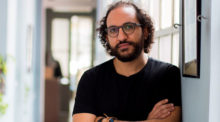Alex Gillis
Last year, Ramy Raoof was working as a senior research technologist in an office in Cairo, Egypt, when he overheard colleagues talking about a potentially dangerous email. Raoof is a research fellow at the Citizen Lab, an interdisciplinary laboratory that works at the intersection of technology, human rights and global security, based at the Munk School of Global Affairs at the University of Toronto. He interrupted his colleagues to ask about the email and soon discovered a massive online attack on hundreds of staff at seven Egyptian organizations, including the Egyptian Initiative for Personal Rights, a human rights non-profit group.
After weeks of digging, Raoof and other Citizen Lab research fellows put together Nile Phish, a report that explained how the attackers had tried to use “phishing” emails to extract passwords and private information from human rights workers being threatened by the Egyptian regime. It was a shocking find that potentially saved many lives.
Citizen Lab collaborates with the world’s leading cyber-security experts, and its research fellows are among the best in the world at investigating digital espionage against civil society (as in Egypt and Syria). Much of their work involves shedding light on sophisticated relationships between corporations and state agencies regarding surveillance activities – activities that are the stuff of nightmares among activists, journalists and anyone challenging an oppressive regime.
Nile Phish is only one of many groundbreaking reports about cyber-security published by approximately 20 Citizen Lab research fellows over the past few years. They work in teams with senior researchers at the Citizen Lab, making headlines around the world. Recent major findings revealed how China, Mexico and the United Arab Emirates allow digital spying and online tools against their own citizens.
“The most important thing I appreciate about the Citizen Lab is the sense of teamwork and collective effort,” explained Raoof, who also assists networks in Central America with information security and activism and recently joined the board of directors for the Tor Project, a non-profit organization that creates privacy technologies.
Thanks to teamwork at the Citizen Lab, Raoof discovered that the seven Egyptian organizations had been among dozens that the Egyptian government had previously terrorized in what many called an unprecedented crackdown against civil society. Using his skills as a technologist and security researcher, the team uncovered a nation-wide surveillance operation that endangered the lives of staff who were working on issues related to freedom of expression, gender rights, torture and forced disappearances. “A good portion of the email attack happened on systems that I’m managing,” Raoof said. “Stopping it improved security and helped others to take steps to build a better world where such dangers aren’t mainstream practices.”
In October, Access Now, a digital-rights defender, recognized Raoof and another Citizen Lab collaborator, Luis Fernando Garcia, as “Heroes of Human Rights” for their efforts in revealing invasive surveillance tactics. Garcia is executive director of R3d Mexico and had uncovered mass deployment of spyware technology in Mexico in conjunction with the Citizen Lab
Garcia also took part in this year’s Citizen Lab Summer Institute on Monitoring Internet Openness and Rights (CLSI), a series of intensive research workshops hosted annually at the Munk School. The goal of CLSI is to form a multidisciplinary community around the study of information controls. Anyone can apply, and a selection committee reviews applicants’ proposals. “The CLSI is a ‘hothouse’ environment, a kind of incubation for all sorts of major collaborative projects that have resulted in major published outputs for us,” said Ron Deibert, director and founder of Citizen Lab.
Citizen Lab also supports students and researchers who are targeted for surveillance. It was instrumental in working with activists such as Noura Al-Jizawi, who had been imprisoned and tortured in Syria. Al-Jizawi first heard about Citizen Lab when her email account came under attack in 2015. The Citizen Lab analyzed the virus and published a report about a large, cyber-espionage campaign that targeted Syrians. Al-Jizawi is now a Master of Global Affairs student, after receiving a scholarship through U of T’s Scholars-at-Risk program.
The Lab offered a fellowship to Raoof after his work on the Nile Phish reports, mainly because he was fully networked into the digital-rights community, especially in Egypt.
“I appoint research fellows to limited terms at the Citizen Lab in order to maximize our ability to work with people who live outside of Toronto and have special skills,” Deibert explained. Raoof’s fellowship enables the Citizen Lab to work more closely on digital threats to journalists working in Egypt in particular.
“We wanted to invest more time and effort into attacks on activists and NGOs in the region and Egypt, as well as to engage with other country-based problems,” Raoof said. “The dedication of the team and the quality of information is crucial. It makes a load of difference.”
November 30, 2017
